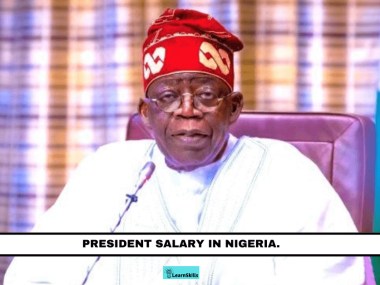If you’re curious about journalist earnings in Nigeria, it’s essential to understand the financial landscape of this important profession.
The average salary for a journalist in Nigeria is around NGN 100,000 to NGN 150,000 per month, depending on experience and location. In Lagos, wages are higher, sometimes reaching around NGN791,288 monthly for experienced journalists.
Journalism in Nigeria has a range of pay, reflecting the diversity of media outlets and the economic factors at play.
Overview of Journalism in Nigeria
Journalism in Nigeria is crucial in shaping public opinion and serving democracy. The practice involves various media houses that contribute to the information landscape and provide a platform for citizens to engage with current events.
Role in Democracy
In Nigeria, journalism serves as a watchdog, holding power to account. Journalists provide vital information that helps citizens make informed decisions. They report on politics, social issues, and human rights, essential for a healthy democracy.
The challenges are significant. Journalists often face threats, censorship, and violence. These obstacles can hinder media freedom and limit the scope of reporting.
Despite this, many journalists remain committed to uncovering the truth and advocating for transparency.
Media Houses in Nigeria
Nigeria has diverse media houses, including newspapers, radio stations, and television networks. Some well-known names include The Guardian, Punch, and NTA. Each of these outlets contributes to the country’s media landscape.
Each media house offers different viewpoints and coverage styles. This diversity allows for a more comprehensive understanding of issues the public faces.
While many organizations operate independently, some face government pressure and political entities affecting their operations.
Journalist Salaries and Compensation
Understanding salaries for journalists in Nigeria is crucial for anyone considering this career. Factors like location and experience affect pay rates, allowing you to see how this job compares to other jobs in the country.
Comparison to Other Nigerian Jobs
Salaries for journalists in Nigeria can vary widely. Salaries range from NGN169,738 (minimum salary) to 352,282 NGN (highest average; actual maximum salary is higher). This is the total monthly salary, including bonuses. Salaries can vary drastically among different job roles.
In comparison, professionals in other fields, such as engineering or finance, often earn higher starting salaries. For instance, an entry-level engineer might earn around NGN 200,000 monthly.
However, senior journalists in major cities like Lagos can earn significantly more, with figures climbing towards NGN 500,000 or higher, depending on the media outlet.
Influence of Experience and Location
Experience plays a key role in determining a journalist’s salary. Entry-level positions typically pay around NGN 100,000, while experienced or senior journalists can earn much more.
Location also matters. Most media companies are based in Lagos, and the wages tend to be higher. A journalist in Lagos may earn NGN200,000, while someone in a smaller city might earn less.
Other factors, such as the type of employment and company benefits, including potential insurance, can also influence overall compensation. Location and experience combine to create a diverse salary landscape for journalists across Nigeria.
Welfare and Working Conditions
The welfare of journalists in Nigeria often falls short of expectations. Many face challenges related to insurance, benefits, and support from professional organizations. Understanding these aspects is crucial for those in the industry.
Insurance and Benefits
Most journalists in Nigeria do not receive adequate insurance and benefits. Many media organizations offer little to no coverage for health insurance, which can leave you vulnerable to high medical expenses.
Additionally, benefits such as retirement plans, paid vacations, and sick leave are often not provided. This lack of support makes it challenging for journalists to secure their financial future and maintain a work-life balance.
Some journalists have reported that benefits offered are often minimal or not fully explained. When considering employment, seek clarity about the welfare package.
Nigerian Union of Journalists Support
The Nigerian Union of Journalists (NUJ) plays a vital role in supporting journalists. It advocates for better working conditions and fair pay in the industry. You can gain access to resources and assistance for issues related to job security and welfare.
The NUJ often negotiates with media houses, ensuring journalists receive the benefits they deserve. Joining this union can provide you with a stronger voice and a network of support.
Membership also includes opportunities for training and professional development, equipping you with the ability to navigate professional challenges effectively. The union aims to improve the overall working conditions for journalists in Nigeria.
Ethical Considerations in Reporting
Ethics plays a key role in Journalism, ensuring the integrity of reporting. Among the main concerns are the standards of practice and the pressures that can lead to unethical decisions, such as accepting bribes.
Practice of Journalism
In Nigeria, ethical journalism is guided by principles that emphasize truth, fairness, and accountability. Journalists are expected to report honestly without bias or favoritism.
The Nigerian Union of Journalists (NUJ) outlines a Code of Ethics that discourages accepting bribes or favors.
You should strive to uphold these standards by verifying information before publishing. This prevents the spread of misinformation and promotes trust with your audience. Engage in responsible reporting that respects the rights of individuals and does not harm society.
Challenges of ‘Brown Envelopes’
“Brown envelopes” refers to journalists accepting money or gifts in exchange for favorable coverage. This undermines the credibility of journalists and the media as a whole.
Accepting bribes can lead to biased reporting. When journalists prioritize financial gain over ethical standards, it damages public trust. The NUJ urges media proprietors for fair compensation to journalists to reduce such temptations.
You must be aware of these challenges and actively reject any offers that compromise your integrity. Establishing a culture of ethical behavior within the newsroom is essential for the future of journalism in Nigeria.
The Impact of Social Media
Social media has changed how journalists report news and interact with their audience. These platforms allow quicker reporting and foster direct engagement, reshaping traditional journalism practices.
Shift in Traditional Reporting
Social media enables journalists to gather and share news in real time. Instead of relying solely on traditional news outlets, you can use platforms like Twitter and Facebook for immediate updates.
- Instant Updates: Breaking news can be shared instantly, allowing you to reach a wider audience more quickly.
- Diverse Sources: Social media broadens your access to diverse sources and viewpoints. This includes user-generated content, which can complement traditional reporting.
You may find that traditional gatekeeping is reduced. As a result, this shift emphasizes verifying information quickly to maintain credibility.
Engagement with Audiences
Social media platforms offer a unique chance to engage directly with your audience. This engagement can enhance trust and foster community.
- Dialogue and Feedback: You can receive immediate feedback through comments and shares. Engaging in conversations helps you understand audience needs and interests.
- Building a Brand: You can build personal or organizational brands through your social media presence. Sharing insights and behind-the-scenes content may personalize your reporting.
This interaction informs your style and shapes how news is consumed and understood in Nigeria.










